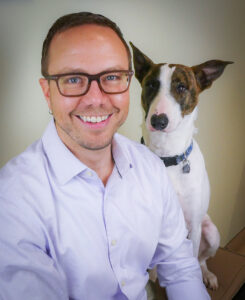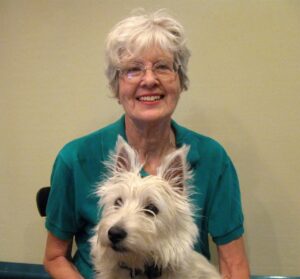By Peg Lopata
Contributing Writer

REGION – Some dog breeds are hyper and shy, some laid back and friendly. Others hard to train, others easy. Right? Maybe not. New research says differences between breeds is very minor. So what’s a good dog for older adults?
Nevertheless, “There are certain tendencies for certain breeds,” said Dr. Andrea Y. Tu, DVM, medical director of Behavior Vets of New York and resident of the American College of Veterinary Behaviorists.
But luckily, a dog’s genes don’t rule how they’ll behave. If you raise a dog from puppyhood, you’re in charge of which behaviors you want to encourage and which you want to discourage.
“Dogs can learn things inconsistent with what their instincts are telling them to do,” explained Tu.
Influence of breed
Recent research by dog geneticist Kathleen Morrill of the University of Massachusetts Chan Medical School in Worcester and her colleagues shows that breed is generally not a good predictor of any individual dog’s behaviors.
But Dr. Christopher Pachel, DVM and a certified animal behavior consultant in Portland, Oregon, tempered this belief. “Every dog is an individual, but there are certain traits that may be more likely to show up when selecting a specific breed of dog,” he noted.
Size matters

Little dogs have the advantage of being able to be picked up so long as you are physically able to bend down to reach them. Dr. Katherine A. Houpt, VMD and professor emeritus at Cornell University, and diplomate at the American College of Veterinary Behaviorists, recommended for less active elders a Bichon Frisé, Maltese, Pomeranian, or Pekinese. Dr. Tu added to that list greyhounds (though not small, she said they’re couch potatoes), toy poodles, and for those prepared to pay for probable health issues, Cavalier King Charles Spaniels. “Cavaliers make excellent lap dogs because they’re sweet and dumb as logs,” she said.
On the other hand, as Dr. Tu explained, very intelligent dogs, such as poodles, can be challenging.
“Do you want to raise another child?” she asked. “If you don’t have the time to dedicate to giving it the level of enrichment that they need, you may have a problem child on your hands.”
Grooming needs
Many of those on the recommended list from Drs. Tu and Houpt do have long hair. That can be a downside.
“A dog whose coat requires extensive hands-on grooming could be a challenge for someone with arthritis,” warned Pachel.
Using a professional groomer is expensive, but necessary for some breeds. That means getting the dog to and from the groomer. Yes, you can teach yourself how to cut your dog’s hair, but it’s not easy to learn and means buying expensive special tools to do it right.
Health problems
As we age, we may develop our own health problems. Do you want a dog prone to health problems too?
Dachshunds or other breeds with very long backs often develop back problems. Dogs with short snouts, such as pugs, often have breathing problems.
“No dog with no noses,” advised Dr. Houpt.
But there’s dozens of health issues that can crop up in any breed, so do your research. Or ask the breeder. Any reputable breeder will offer this information up willingly. If they don’t? Find another breeder.
We have a great deal to do with the ways our dogs behave. It’s up to how much time we devote to training. Pomeranians may bark a lot, but you can control that. Terriers can be trained to be less tenacious and poodles less bothersome because they’re bored.
Further advice

The best predictor for personality is the dog’s parents said Dr. Tu. “Go to the breeder and meet the parents. A puppy’s parent’s personalities are important,” she explained. “Also, get your puppy when they’re around seven or eight weeks old.”
With attentive training, added Dr. Tu, “This can give you the chance to create the personality you’re hoping for.”
Still confused as to which breed is best for you? Don’t know if you’re up to training a puppy?
Maybe Dr. Tu has the answer: “You want a cat!”
RELATED CONTENT:
Pets have the power to improve our health and well-being (fiftyplusadvocate.com)
Estate planning for pets ensures your wishes are honored (fiftyplusadvocate.com)
Dogs can present challenges for obtaining home health care (fiftyplusadvocate.com)












